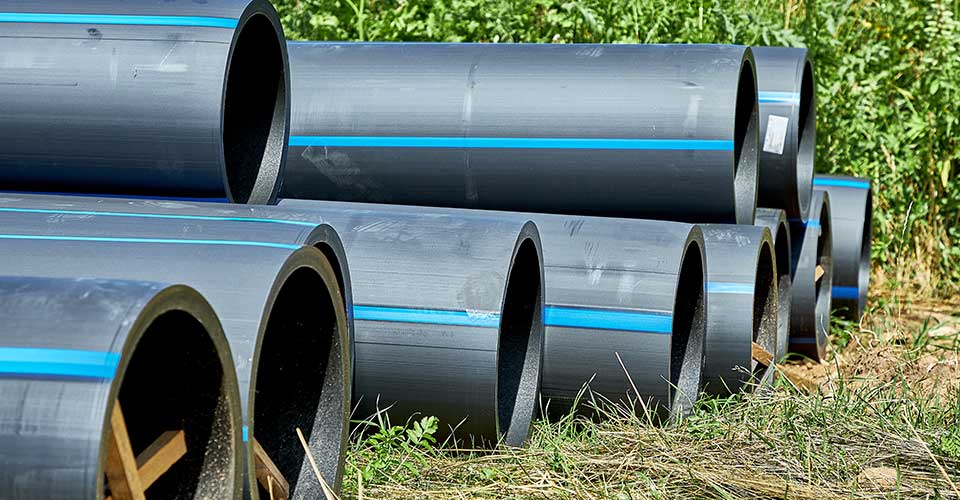Understanding the Key Perks of HDPE Pipeline for Water and Wastewater Monitoring
Using HDPE pipeline in water and wastewater management provides many benefits that warrant factor to consider. Its extraordinary durability and long lifespan make it a preferred choice for numerous jobs. Furthermore, the product's resistance to rust and chemical damages boosts its dependability in numerous settings. Nonetheless, the advantages prolong beyond just long life and resistance. Exploring its cost-effectiveness and ecological effect reveals a lot more compelling factors for its extensive adoption in modern facilities
Phenomenal Toughness and Durability

HDPE pipe attracts attention for its extraordinary durability and durability, making it a recommended choice in water management systems. Built from high-density polyethylene, these pipelines can endure considerable stress and tension, making certain trustworthy performance in time. Their durable nature permits them to sustain extreme environmental problems, consisting of temperature fluctuations and dirt activities, which can create various other materials to stop working.
The life-span of HDPE pipelines often exceeds 50 years, supplying an affordable remedy for municipalities and industries alike. Additionally, the material's lightweight homes streamline installation, decreasing labor costs and timeframes. This sturdiness lessens the demand for constant repairs or replacements, even more enhancing its economic appeal.
In water management applications, the dependability of HDPE pipes implies fewer disruptions and enhanced solution connection, making them integral to lasting facilities growth. The combination of toughness and durability solidifies HDPE's role as a foundation in efficient water administration solutions.

Resistance to Corrosion and Chemical Damages
While several materials catch corrosion and chemical damages in time, HDPE pipelines exhibit exceptional resistance, making them perfect for numerous water monitoring applications. This strength stems from the molecular structure of high-density polyethylene, which is inherently non-reactive and does not corrode like metals or degrade from exposure to rough chemicals. Because of this, HDPE is very efficient in atmospheres with hostile materials, such as wastewater systems that may consist of acids, bases, and organic solvents.
Additionally, HDPE pipes can endure ecological factors such as soil level of acidity and saline problems, better improving their viability for diverse applications (hdpe pipe in stock Midland TX). Their capacity to keep structural integrity with time decreases the danger of leakages and failings, which is essential in making sure the safety and security and dependability of water distribution and wastewater management systems. The resistance to deterioration and chemical damages substantially adds to the total performance and long life of HDPE piping solutions.
Cost-Effectiveness and Financial Benefits
When thinking about the monetary effects of water monitoring systems, the cost-effectiveness of HDPE pipelines ends up being apparent. These pipes offer lower setup and maintenance costs compared to traditional products like metal or concrete. Their light-weight nature simplifies transportation and installation, causing minimized labor costs. Additionally, HDPE pipelines display a long life expectancy, commonly going beyond 50 years, which translates to less replacements and lasting savings.
The resistance of HDPE to deterioration and chemical damage decreases the requirement for costly fixings and replacements. The pipelines also sustain efficient water circulation, decreasing power expenses related to pumping systems. By alleviating leaks and water loss, HDPE pipes add to considerable economic advantages for municipalities and markets alike. Overall, the preliminary investment in HDPE piping can produce substantial economic returns over the life expectancy of the water monitoring system, making it a prudent selection for sustainable facilities growth.
Environmental Sustainability and Reduced Effect

Convenience and Adaptability in Setup
Since of their distinct buildings, HDPE pipelines supply impressive convenience and adaptability in setup, making them appropriate for a vast array of applications. Their light-weight nature permits simpler handling and transportation, lowering labor expenses and setup rubber reducer time. HDPE pipes can be bent and formed to fit different terrains and look at this web-site project needs, which is especially useful in challenging settings.
Furthermore, their resistance to rust and chemical damage permits setup in diverse setups without the need for specialized safety finishes. The ability to fuse joints creates a continual, leak-free system, improving the total stability and reliability of the setup. HDPE's flexibility additionally suits ground movement, lowering the danger of damages in areas vulnerable to shifting dirt. Overall, these features make HDPE pipelines not just versatile yet also a favored selection for water and wastewater management systems.
Often Asked Questions
Just How Does HDPE Pipe Compare to PVC in Water Monitoring Applications?
HDPE pipeline provides remarkable flexibility, resistance to rust, and toughness compared to PVC. Its lighter weight helps with less complicated installation, while its long life expectancy lowers substitute costs, making HDPE a recommended choice in water administration applications.
What Is the Life Expectancy of HDPE Piping Under Typical Conditions?
Under common conditions, HDPE pipes can have a life-span ranging from 50 to 100 years. Their resilience and resistance to rust add to their lasting efficiency in various applications, making them a trusted selection for infrastructure.
Are HDPE Water Lines Recyclable After Their Life Span?
Yes, HDPE pipelines are recyclable after their life span. Midland TX HDPE Pipe Fittings in Stock. They can be processed and repurposed right into brand-new products, considerably decreasing environmental impact and advertising sustainability within the visit sector, making them an environment-friendly choice for piping services
What Is the Installment Process for HDPE Pipes?
The installment process for HDPE pipelines includes site prep work, trenching, pipeline fusion or mechanical signing up with, backfilling, and stress testing. Correct methods guarantee a resilient and effective system for carrying water and wastewater efficiently.
Can HDPE Pipes Be Made Use Of for Both Potable and Non-Potable Water Equipments?
Yes, HDPE pipes can be made use of for both drinkable and non-potable water supply. Their flexibility, resilience, and resistance to deterioration make them appropriate for numerous applications, making certain risk-free and efficient transportation of water in various contexts.